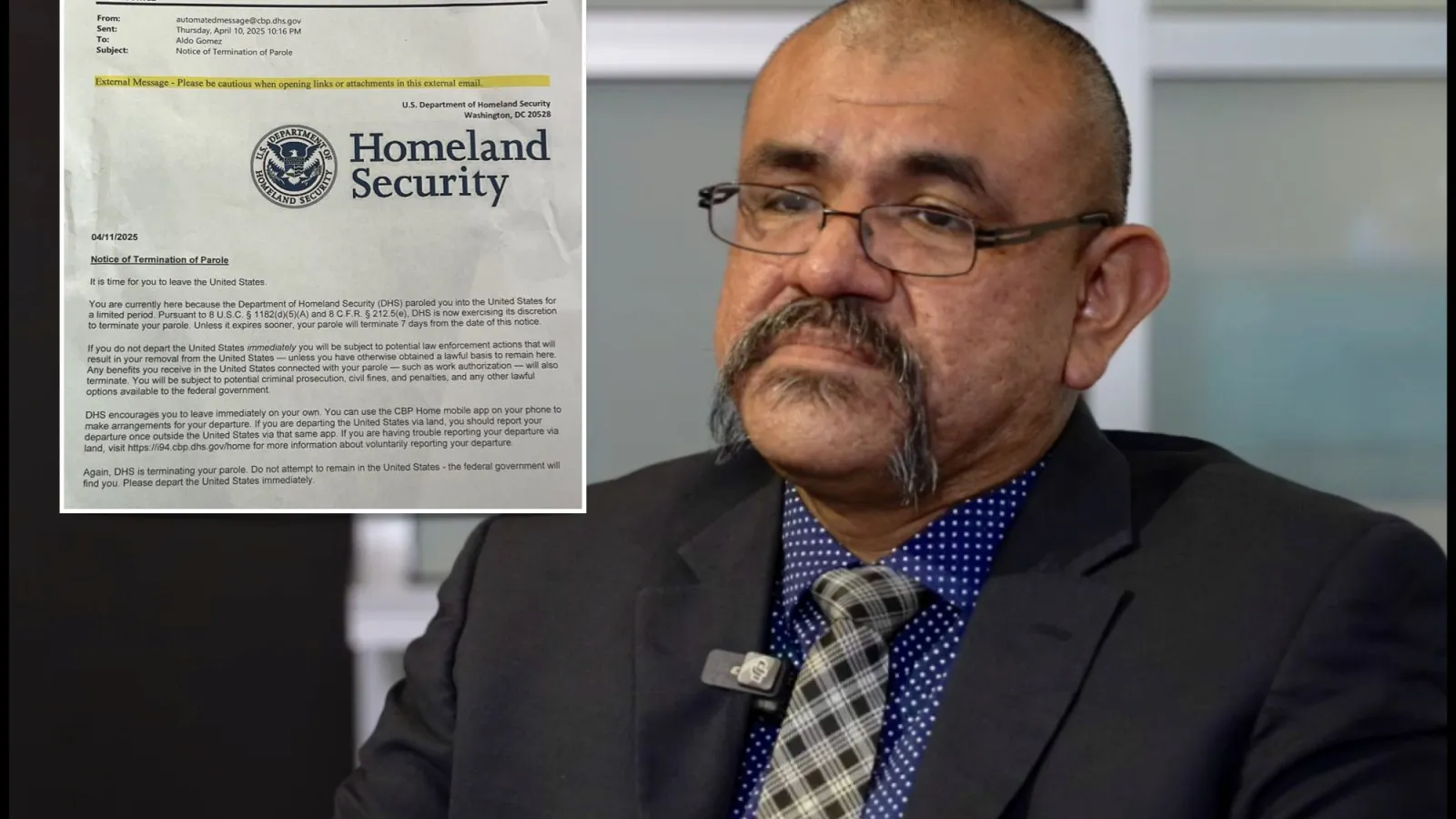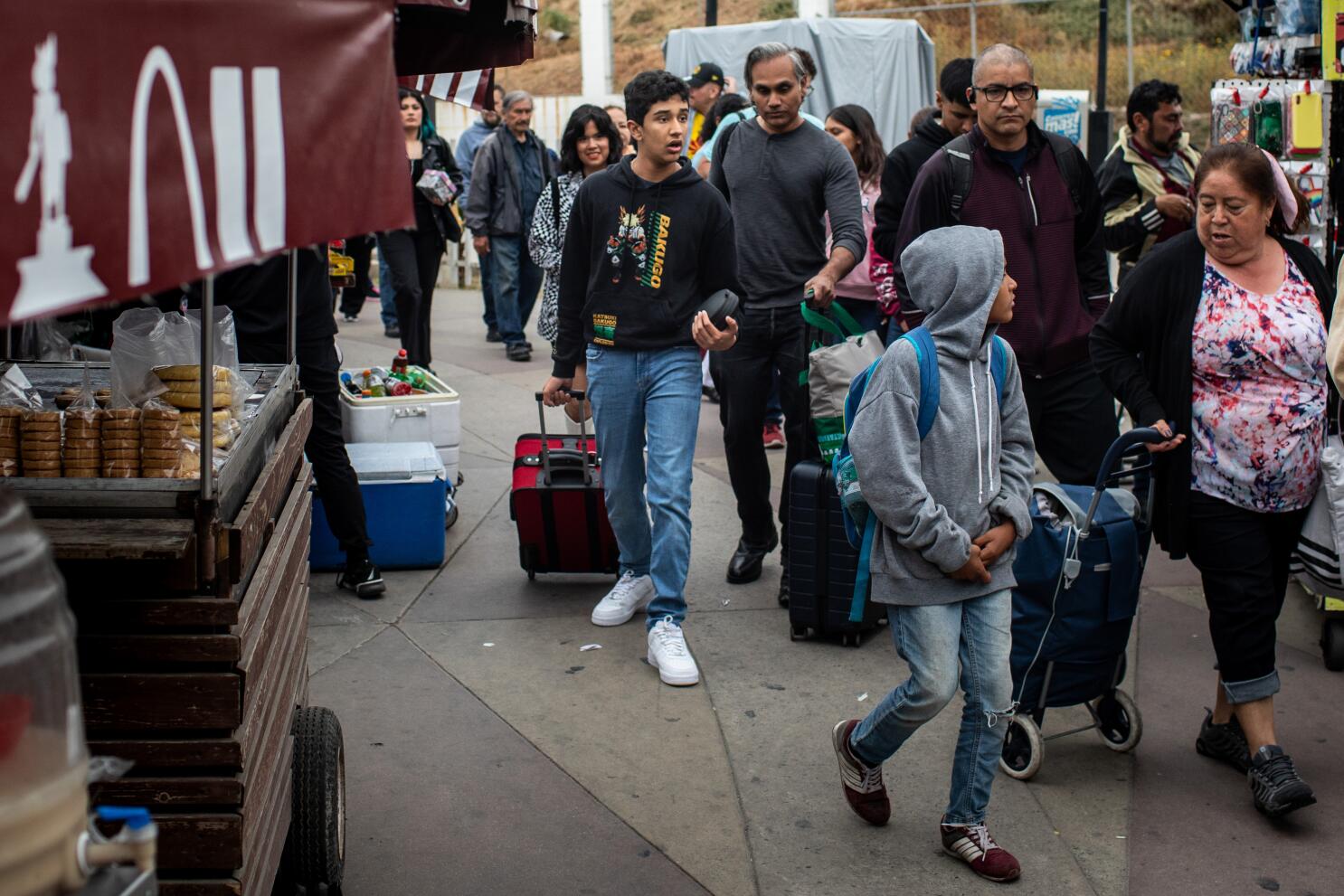
A California-born U.S. citizen is demanding answers after receiving an alarming email from the Department of Homeland Security ordering him to leave the country within seven days or face criminal prosecution.
The message, which warned him that the federal government would track him down if he stayed, has ignited fears of mistaken identity and raised questions about whether government databases are mistakenly targeting American citizens due to flawed immigration data or retaliation tied to advocacy work.
Aldo Martinez-Gomez, who was born in National City and has lived his entire life in San Diego County, found himself at the center of a bureaucratic nightmare earlier this month when the unsolicited email from DHS arrived in his inbox.
The language was direct and chilling. “Do not attempt to remain in the United States – The federal government will find you,” the email read. It demanded his departure from the U.S. within one week, threatening legal action and financial penalties should he fail to comply.
The notice was not accompanied by any prior correspondence, explanation, or verification process.
Martinez-Gomez, a full-time accredited representative who works with immigrants through a nonprofit legal aid organization, believes his position may be linked to the message. He regularly represents non-citizens in immigration court and advocates for immigrant rights, making him a vocal participant in some of the most contentious legal and political debates in the country.
“I believe I received it because I’m an accredited representative, and I represent immigrants, and I advocate for immigrants’ rights in the court,” he said, expressing concern that his visibility in immigration cases may have made him a target, whether through error or design.
He immediately provided a copy of his official U.S. birth certificate to authorities to reaffirm his citizenship status. Despite this, he has been left unsettled by the lack of follow-up and clarity, and he has begun preparing contingency plans with relatives in case the situation escalates.

The psychological toll has been severe, he says, affecting his ability to perform his work and casting a shadow over his day-to-day life. “I’m not seeking fame or attention. I just want to bring light to this issue because I’m not trying to be one of the government’s mistakes,” he explained.
This is not the first incident of its kind in recent days. A similar email was reportedly received by a Massachusetts-based immigration attorney, suggesting the issue may not be isolated.
That attorney, who also works with vulnerable immigrant populations, described the experience as both confusing and deeply disturbing. The incident has sparked concern among legal professionals and civil rights organizations that government surveillance tools or immigration enforcement databases may be casting too wide a net, potentially ensnaring citizens who are mistakenly flagged due to their association with immigration cases.
In response to growing questions, a senior official from the Department of Homeland Security released a statement acknowledging that some notices may have been sent to “unintended recipients” if their contact information was mistakenly associated with migrant files.
The official said the agency was investigating the issue and would resolve such mistakes on an individual basis. No detailed plan was offered for preventing such errors in the future or for safeguarding citizens from the consequences of wrongful enforcement actions.
The explanation offered little comfort to Martinez-Gomez, who remains on edge and unsure whether additional legal consequences might follow. “I do get nervous,” he admitted. “They have been talking about deporting U.S. citizens, so it is a concern.” His fear is not unfounded.
In recent years, there have been reports of U.S. citizens being mistakenly detained or nearly deported due to flawed immigration records, misidentified biometric data, or bureaucratic lapses. In some cases, individuals have spent weeks or even months in detention facilities before successfully proving their citizenship.
What makes Martinez-Gomez’s case particularly troubling is the speed and tone of the warning he received. The email offered no opportunity for verification, no official process for appeal, and no explanation for how or why he was targeted.
Instead, it operated under the assumption that he was in the country unlawfully and demanded immediate compliance under threat of prosecution.
Legal experts say this approach is dangerous and may constitute a violation of civil rights if pursued without cause. They warn that the use of automated systems and data scraping to generate enforcement actions can lead to catastrophic errors when not checked by human oversight.
Advocates also argue that government agencies need clearer protocols for resolving mistaken identity cases, especially when dealing with the citizenship status of individuals born on U.S. soil.
The case has begun drawing attention from civil liberties groups, who say it demonstrates a chilling trend in immigration enforcement. The American Civil Liberties Union and similar organizations have previously raised concerns about how citizens with Hispanic or Latino surnames are disproportionately affected by immigration errors, especially when they live in states near the southern border or have frequent contact with non-citizen communities.
Martinez-Gomez’s advocacy work appears to be at the heart of the confusion. As someone who regularly speaks in court on behalf of undocumented individuals, he maintains extensive communication with legal aid networks, immigration courts, and migrant clients.
It is possible, he speculates, that his name or email address was included in a client’s file or submitted in error during a documentation process. Still, he insists that the government should have verified his status before issuing such a threatening directive.
Even more troubling is the lack of recourse. As of now, Martinez-Gomez says he has received no apology or retraction, only vague references to internal reviews and individual case handling.

He continues to live and work in San Diego, unsure of whether another email or government action could abruptly change the course of his life. The experience has also had a chilling effect on his advocacy work.
He now fears that attending court hearings or speaking publicly could result in unwanted attention or even detention. He has discussed temporary housing options with family members in case the situation escalates, and he says he no longer feels entirely safe in his own country.
The incident has also become a flashpoint in a broader national conversation about how immigration enforcement intersects with civil liberties. In an era where technology is increasingly used to automate immigration decisions and surveillance, Martinez-Gomez’s story is a stark reminder that even native-born citizens can find themselves vulnerable to errors or abuses.
The fear he describes is not theoretical—it is rooted in the reality of a government that, at least in this instance, treated him like a foreign threat without cause.
As the Department of Homeland Security scrambles to contain the fallout from this apparent blunder, questions continue to mount. How many other citizens have received similar notices?
What systems are in place to prevent such mistakes from recurring? And how does a government apologize to someone it has effectively told to vanish from their own country?
For now, Aldo Martinez-Gomez remains in limbo, armed with his birth certificate, his knowledge of the law, and a growing sense of unease. He continues to work on behalf of immigrant clients, even as he wonders if he himself will need protection from the very system he once trusted.

His story is not just about a mistaken email—it is about the fragile line between security and civil rights, and the price individuals may pay when that line is crossed without warning.




